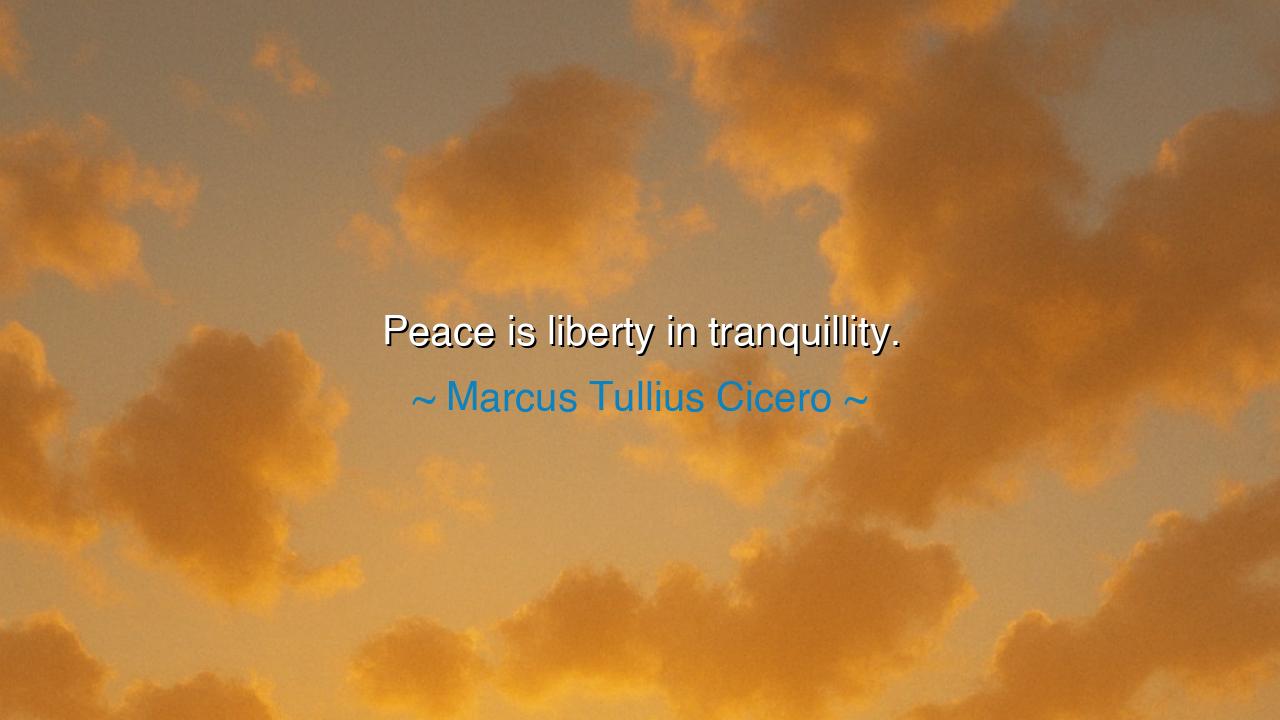
Peace is liberty in tranquillity.






Marcus Tullius Cicero, the Roman orator, statesman, and philosopher, once proclaimed: “Peace is liberty in tranquillity.” These words, simple yet profound, echo like the voice of an elder across the centuries. They remind us that peace is not merely the absence of conflict, but the condition in which liberty—the rightful freedom of the soul and of the people—can breathe without fear. For Cicero, who lived in an age when Rome shook with civil wars and the rise of tyranny, peace was not a fragile truce, but the highest form of ordered freedom: a harmony where men are free, and their freedom is safe within the stillness of tranquillity.
To understand the origin of this utterance, one must see Cicero’s world. Rome, once a republic of balance and law, had been torn by the ambitions of generals and the corruption of rulers. Cicero himself was caught between the grasp of Pompey, Caesar, and later Antony, watching the Republic slip into the hands of emperors. His longing for peace was not weakness, but a yearning for the return of justice and freedom under law. He knew that liberty without peace is chaos, and peace without liberty is tyranny. True peace, then, is both—freedom safeguarded by calm, and calm sustained by freedom.
The power of his teaching is that it speaks to every age. For what good is freedom, if a man must wield it amidst the thunder of endless war? And what good is peace, if it is the silence of the slave beneath the oppressor’s heel? Cicero binds these two together, teaching us that freedom and tranquillity are not enemies, but twins. Liberty without tranquillity is restless; tranquillity without liberty is hollow. Only together do they form the true state of peace.
History confirms this. Consider the founding of the United States, where the people, having thrown off the chains of empire, sought to establish both liberty and peace. They declared their independence through war, but they knew that war alone could not secure their destiny. It was in the forging of laws, the building of institutions, and the establishment of justice that their true peace was born. George Washington, when he laid down his sword to become a citizen once more, embodied Cicero’s wisdom: liberty preserved in the tranquillity of peace. He could have seized power as a king, but by refusing it, he allowed his people to taste both freedom and calm.
And yet, the opposite is also true. Where tranquillity has been purchased at the cost of liberty, peace has proven false. Recall the long shadow of the Soviet Union, where silence reigned, but it was the silence of fear. The tranquillity of the streets was not the tranquillity Cicero envisioned—it was the stillness of chains, the order of oppression. This, too, proves Cicero’s point: peace must be both liberty and tranquillity together. Anything less is a mirage.
The lesson, then, is clear: strive always for a peace that honors freedom. In your personal life, do not seek calm by burying your voice, nor seek freedom by burning the world around you. Instead, build harmony where your liberty and the liberty of others can coexist, unthreatened by fear. Peace in the home, peace in the community, peace in the nation—these are born not from dominance, but from justice, mutual respect, and self-mastery.
Practically, this means practicing restraint before anger, patience before judgment, and fairness before power. Defend your freedom, but never with cruelty. Seek tranquillity, but never at the expense of truth. If you find discord in your own heart, first rule yourself—for he who conquers himself has already found liberty in tranquillity. And if you find conflict among others, be the one who brings calm without chains, and justice without violence.
Thus Cicero’s words remain eternal: “Peace is liberty in tranquillity.” Let them guide rulers and citizens, families and nations. For when men are free, and their freedom lives undisturbed in the quiet of tranquillity, then the world is not only safe—it is whole. This is the peace worth seeking, the peace worth defending, and the peace worth passing down to generations yet unborn.






AAdministratorAdministrator
Welcome, honored guests. Please leave a comment, we will respond soon